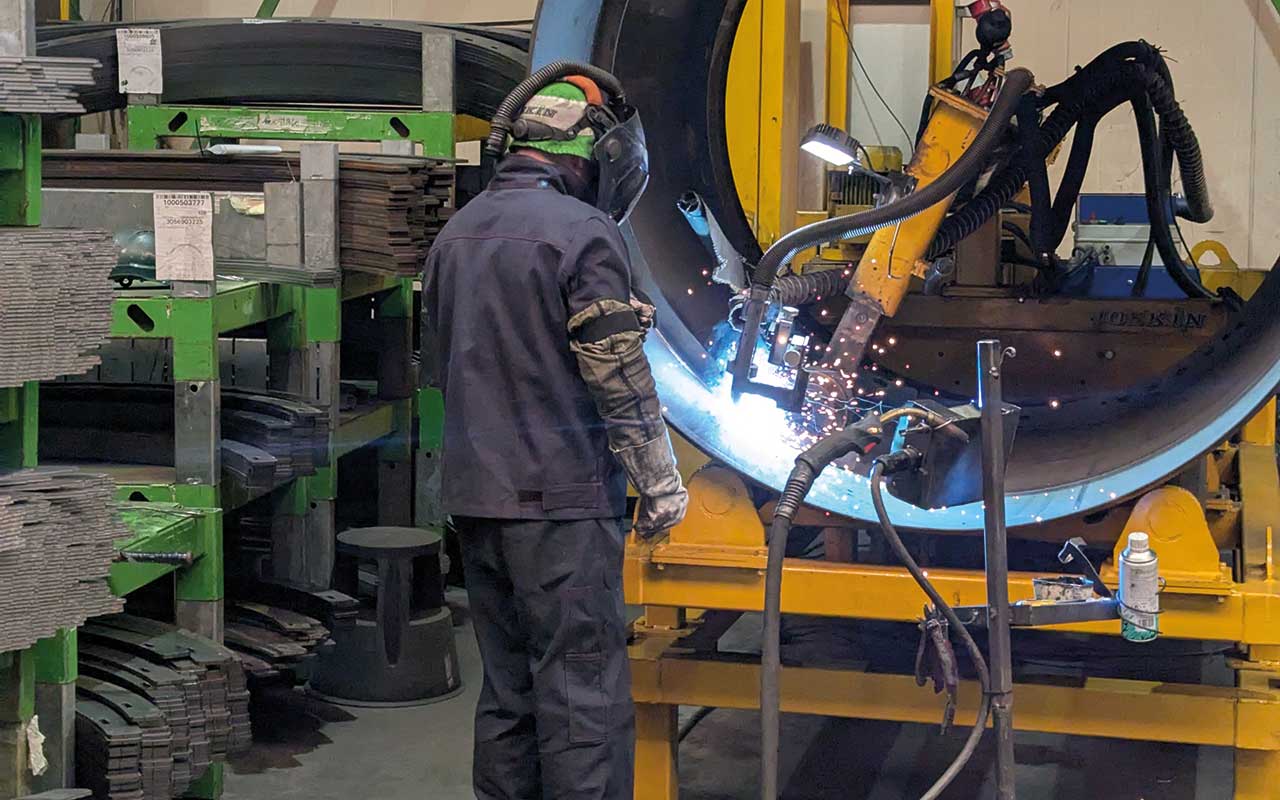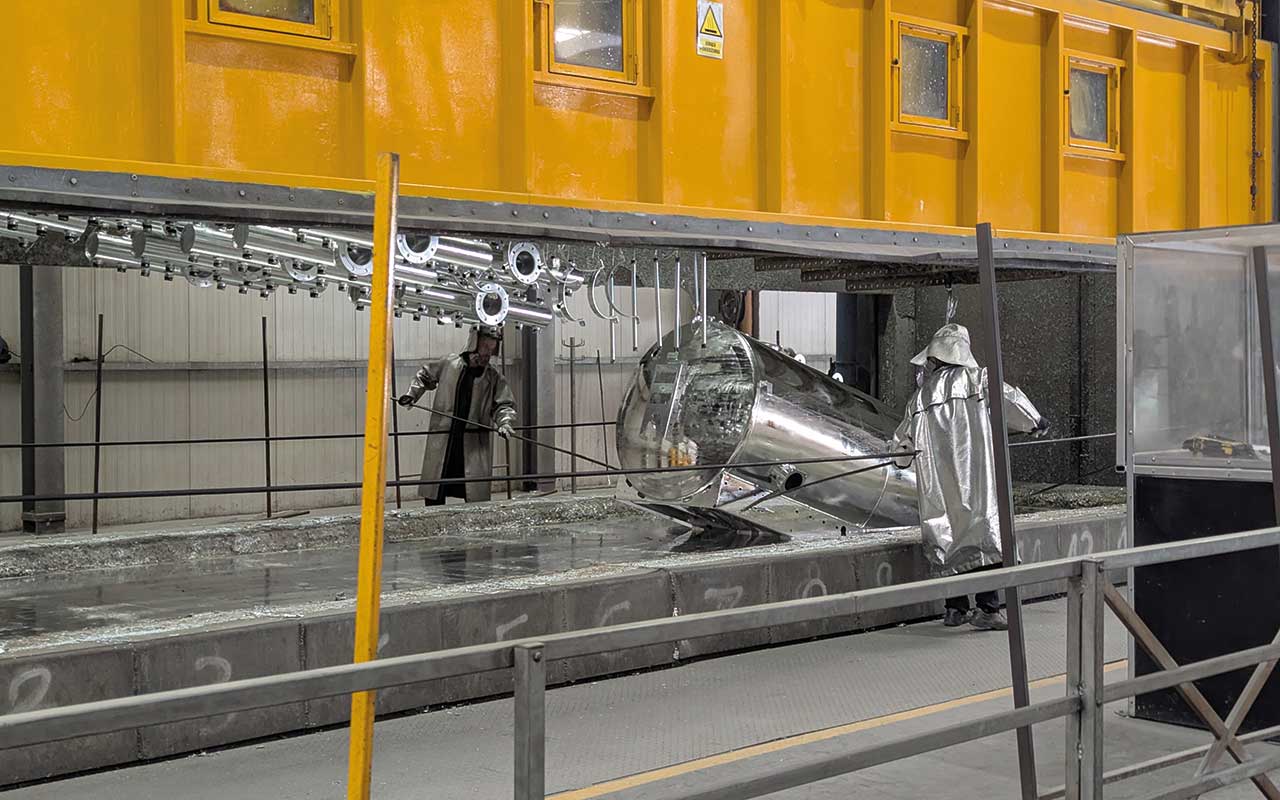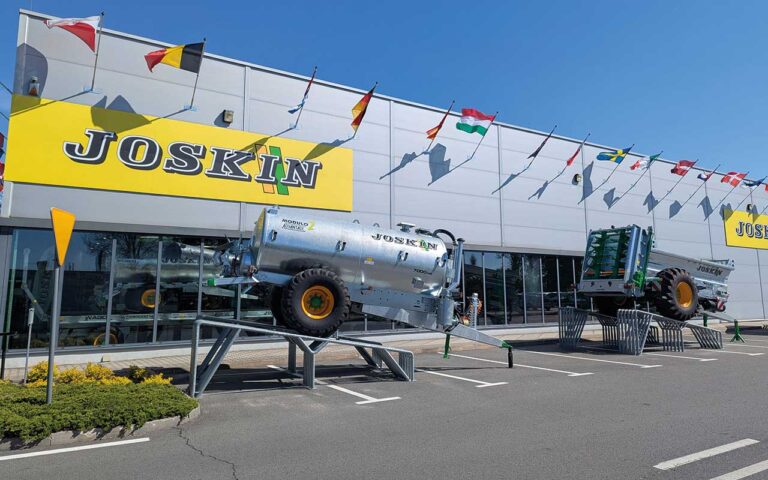Based on a 30ha site near Trzcianka in the north-west of the country, Joskin’s Polish factory celebrated 25 years in 2023 and has expanded rapidly to become a key part of the Joskin Group.
There were two reasons for opening the factory. Eastern Europe, and particularly Poland, was a fast-growing market in the late 1990s, and founder Victor Joskin was keen to build on this.
There was also a shortage of skilled welders in the company’s home country, Belgium.
So, when the Polish site opened in 1999, the majority of the 43 staff members were welders. Now the company employs 380 workers, with about 90 welders at any one time, and it is the second-largest production plant in the group’s portfolio.
As the Polish plant has expanded, it has been used further. No longer just a site for welding work, it has eight assembly lines to produce slurry tankers, muckspreaders and much of the company’s trailer portfolio, acting as a gateway to the Eastern European market, as well as building components that are sent to one of the four Joskin sites across Belgium and France.
The headline feature of Joskin Polska is its galvanisation plant, a €15m investment that was opened in 2010.
According to export manager Jean-Marc Vanempten, the company had previously worked with five different companies around Belgium to handle the galvanising process.
“This was costly, and something we had little control over,” he says. “There were a lot of challenges to setting up our own plant, but we now have full control of the quality of the finish.”

Hot zinc
The galvanisation plant has a capacity of 20,000t/year, and currently produces about half of that, meeting Joskin’s demands, as well as taking on contracts with other companies. “It’s imperative that we keep the plant working,” says Jean-Marc.
“The zinc needs to be heated to 450C, and this takes 30 days to melt and heat. This means we cannot shut the plant down, apart from for the most urgent cleaning. Keeping the plant at this temperature costs a huge amount of money, so we’re keen to increase the throughput.”
Before being dipped into the zinc, parts go through a treatment process. Thirteen treatment baths are built into a closed-off, fully ventilated area of the plant.
According to the company it is one of the most environmentally friendly galvanising plants in the world.
After being hung on racks, parts are automatically transferred from bath to bath to go through the degreasing, pickling, rinsing and fluxing processes that ensure the galvanisation will take.
To ensure that this process is consistent from part to part and day to day, the baths are tested every day.
After the treatment baths, the parts are dried and then heated in an annealing process, which increases the ductility of the metal. This not only cuts the risk of thermal shock when the steel is submerged in the zinc bath, but also ensures the zinc penetrates the metal.
As the parts are dipped into the zinc bath, the angle and speed of submersion is adjusted. This is to ensure the whole component is fully coated. The zinc formulation is supplemented with alloys, which Joskin says gives the shiny finish.
“Due to the coating process and a build-up of zinc ash and solidified metals, the bath loses around 2mm each year,” explains Jean-Marc.
“At a certain point the bath needs to be emptied and completely cleaned out, but this is a very costly process.”
Galvanised components are either retained in Poland to be part of the production lines or shipped back to one of the four other factories.
When asked about the transport costs of moving products multiple times across Europe, Jean-Marc noted that the way products are produced by Joskin means trucks rarely, if ever, run empty from site to site.
“The lorries are filled with galvanised components, welded assemblies and completed machines, and we can ship assemblies and machines back to the Polish site,” he says.

Building up the portfolio
Beginning with a 6ha site, the Joskin Polska site has grown to about 30ha, with more development expected in the next couple of years.
Around 72,000sq m is under roof, with eight assembly lines, semi-automatic shot-blasting and paint lines, warehouses, a Technic visitors centre (identical to the one found at Joskin’s headquarters in Soumagne) and office buildings and accommodation for up to 50 people.
It also has a warehouse, which is 12m high to maximise storage space. Nearly 340,000 parts are stored on site, with 4,450 different references. This is alongside the automated warehouse for small components, which holds nearly 3,500 parts.
As the site has developed, certain product lines have been moved entirely to Poland. The company’s SiloSpace2 silage trailers are only made at this factory, alongside the dropside tipping trailers, which Jean-Marc says has a large Eastern European market.
Chassis for the Drakker trailer range are also built in Poland, as well as slurry booms and injectors and the Wago bale trailer range, and there is capacity to build monocoque trailer bodies when the French site is flat out.
The welding workshops are responsible for welding the slurry tanker bodies, similar to the Belgian SpawTech site.
Alongside welders who handle much of the tack welding work, there are seven robotic units for small components, working in runs of at least 50 parts to maximise efficiency, and two large robot welders to handle the bodywork.
Whereas a human welding the tanker bodies could take upwards of a full day, if not multiple days, the robotic units can do the same work in a matter of hours, significantly increasing the efficiency of the plant.
Jean-Marc explains that there is also a level of consistency to the robot welders.
“Every weld done by these units is the same, regardless of the time of day, or whether its nearing the end of the week, meaning we can guarantee the quality across our machines.”
Like the welding halls in Belgium, the jogs are designed and manufactured by Joskin, meaning they are perfectly suited to the company’s needs.
There are also six press brakes for bending steel at the factory. These can handle sheet steel up to 4m longer, with longer sheets up to 9m bent in Belgium and shipped to the other factories as required.
Another novel part of the factory is the tank bending unit, which uses a CNC machine with four rollers to bend steel sheets into the cylinders for the slurry tankers.
These are then edged to allow an overlap and to ensure that the welding takes on the edges. Once the tank is rolled, it is moved to one of the large body welding units and then placed on a rollover machine so brackets can be manually welded to the machine.
Jean-Marc says the company plans to start production of its own tanker doors, rather than buying in from a supplier. This would better use the capacity of its factories and give the company greater control of the final product quality.
Another 16,000sq m is set to be developed in the coming years. A new welding hall (6,300sq m) will be built, with the old welding hall allocated to the production of tipping and livestock trailers. A 4,300sq m paintshop will also be built, alongside a new assembly hall.
The Joskin family
Joskin remains a family business, with Victor still involved day to day alongside his wife, Marie-José, and their children, Didier, Vinciane and Murielle. Speaking with Victor and Didier at the Polska factory, they said they were continuing to invest in all their sites, as well as developing a new factory in Luxembourg to meet future demand.
“We see that demand for larger equipment will continue to grow,” says Didier. “So, while the number of machines may reduce, the complexity and amount of production will remain the same, if not increase.”
This will be balanced by continuing difficulties in sourcing skilled labour, which has driven investment in automated processes.
“Our investment in the background processes of our factories, including monitoring stock and our parts list, means we’re investing in the backup of our machines. This will make it easier for customers to access spare parts.”
As for whether Joskin will use the Polish site to develop products specifically for the Eastern European market, neither Didier nor Victor believe this will happen.
“Our focus is on developing the markets we are involved in, and filling out the product ranges so that we can offer a comprehensive series to our customers.”


